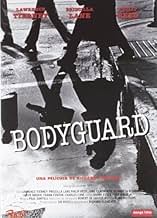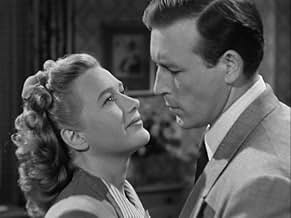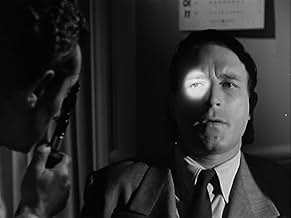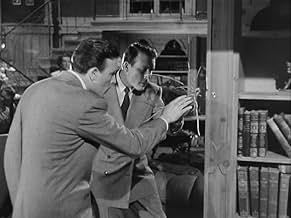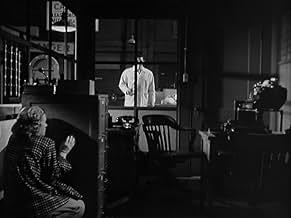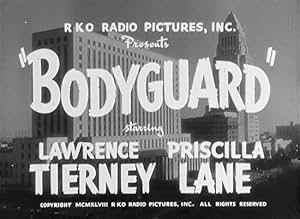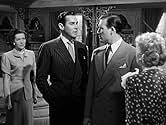NOTE IMDb
6,5/10
1,3 k
MA NOTE
Ajouter une intrigue dans votre langueAfter being fired for insubordination, homicide detective Mike Carter is hired as bodyguard by the owner of a local meat-packing plant where a meat inspector has been murdered.After being fired for insubordination, homicide detective Mike Carter is hired as bodyguard by the owner of a local meat-packing plant where a meat inspector has been murdered.After being fired for insubordination, homicide detective Mike Carter is hired as bodyguard by the owner of a local meat-packing plant where a meat inspector has been murdered.
- Réalisation
- Scénario
- Casting principal
Erville Alderson
- Adam Stone
- (non crédité)
Bobby Barber
- Little Man in Street
- (non crédité)
Charles Bedell
- Cop
- (non crédité)
Claire Carleton
- Zinnia
- (non crédité)
Russ Clark
- Cop
- (non crédité)
Marcelle Corday
- Madalena
- (non crédité)
David Cota
- Pachuco
- (non crédité)
Joe Devlin
- Detective Sgt. Burch
- (non crédité)
Dante DiPaolo
- Young Man in Police Station
- (non crédité)
Avis à la une
BODYGUARD (1948) is a snappy 62-min. b&w noir programmer directed by Richard Fleischer and starring Lawrence Tierney. Rather than repeat what others have said here, I'd rather emphasize a couple of things that truly distinguish this film. For one thing, it was filmed largely on location at sites all over Los Angeles. Ex-policeman Mike Carter (Lawrence Tierney), trying to clear himself of a false murder charge, moves around L.A. quite vigorously in the course of his investigation, sometimes by car, sometimes by cab, and sometimes on foot, traveling to shops, offices, back alleys, factories, piers, and amusement arcades all over the city. If you like seeing film footage of L.A. in the 1940s, there are many films with abundant footage, but none quite like this one.
Also, I'd like to single out a very clever scene that offers an ingenious method of secretly transmitting key information from one location to another in the era before fax machines, cell phones, or e-mail. Carter needs the contents of a case file kept by the police officer whose murder he's been framed for. Only his girlfriend, Doris (Priscilla Lane), who works in the department, can find the file for him. He tells her over the phone to write down all the important cases handled by the officer in the past year and then go to an amusement arcade on 3rd Street, find a "Record Your Own Voice" booth and read all the cases into the microphone onto as many vinyl records (78 rpm) as needed, and then to leave the stack of records for him at the cashier's counter under an assumed name. Carter's plan is to go to the arcade, give the assumed name, enter an available booth and listen to the records until he finds the case he's looking for. There are wonderful little details of character and street life woven into the scene (and just about every scene in the movie). When Carter first enters the arcade, the brassy blonde at the counter is flirting with two sailors and claims not to know anything about a stack of records for a "Mr. Nolan." An anxious Carter gets insistent and the two sailors turn on him, spoiling for a fight. Only then does the manager come over and defuse the situation and find the package of records for Carter. It's just a brief moment but it not only adds to the suspense, but captures so much of the tenor of the time and place.
The basic plot itself-corrupt industrialist covers up shady business practices via murder and convenient frame-ups-would get recycled ad infinitum on TV cop shows in the 1970s. But it might have seemed somewhat fresh back in 1948, especially after ALL MY SONS (also 1948), based on Arthur Miller's play, raised a similar issue in a drama of a wartime industrialist who sends out defective airplane parts with tragic results.
Also, I'd like to single out a very clever scene that offers an ingenious method of secretly transmitting key information from one location to another in the era before fax machines, cell phones, or e-mail. Carter needs the contents of a case file kept by the police officer whose murder he's been framed for. Only his girlfriend, Doris (Priscilla Lane), who works in the department, can find the file for him. He tells her over the phone to write down all the important cases handled by the officer in the past year and then go to an amusement arcade on 3rd Street, find a "Record Your Own Voice" booth and read all the cases into the microphone onto as many vinyl records (78 rpm) as needed, and then to leave the stack of records for him at the cashier's counter under an assumed name. Carter's plan is to go to the arcade, give the assumed name, enter an available booth and listen to the records until he finds the case he's looking for. There are wonderful little details of character and street life woven into the scene (and just about every scene in the movie). When Carter first enters the arcade, the brassy blonde at the counter is flirting with two sailors and claims not to know anything about a stack of records for a "Mr. Nolan." An anxious Carter gets insistent and the two sailors turn on him, spoiling for a fight. Only then does the manager come over and defuse the situation and find the package of records for Carter. It's just a brief moment but it not only adds to the suspense, but captures so much of the tenor of the time and place.
The basic plot itself-corrupt industrialist covers up shady business practices via murder and convenient frame-ups-would get recycled ad infinitum on TV cop shows in the 1970s. But it might have seemed somewhat fresh back in 1948, especially after ALL MY SONS (also 1948), based on Arthur Miller's play, raised a similar issue in a drama of a wartime industrialist who sends out defective airplane parts with tragic results.
A consensus seems to exist among commentators on Richard Fleischer's Bodyguard, based on a story by the young Robert Altman. The consensus is that, as it stands, it fails to satisfy; the background to this verdict is that somewhere there is or at least was a longer cut of the picture that probably would have been, if not a little masterpiece of film noir, a less nettlesome movie.
Feral Lawrence Tierney, a detective fired from the force for insubordination, gets offered the job of bodyguard to a old woman whose wealth comes from the meat-packing industry. At first reluctant, he accepts when shots shatter a mirror in the woman's home. Following her on a nocturnal errand, he's coshed on the head and comes to in his car parked on railway tracks; riding shotgun is the police officer who fired him, dead. Now the prime suspect, he lams up.
Assisting him in his efforts to clear himself is Priscilla Lane, his mole in police headquarters. (They devise a curious means of communication. She reads the files onto 78s and delivers them to a record store where he listens to them in a booth.) It turns out that his murdered superior investigated the death of a meat inspector at one of the plants owned by his employer....
What remains of the movie is directed with pace and even some style by Richard Fleischer (The Narrow Margin, Armored Car Robbery, The Boston Strangler; he showed a lot of sass in his early days, before he ossified into a hack.) But what we lack compromises what we have. The 13 minutes excised from the movie somewhere along the line no doubt patch up the holes in the leaky plot like, who knew Tierney was off to the optometrist's office and set up the ambush?
A fuller version would probably make, as has been remarked, for a more grisly final confrontation, a la Upton Sinclair's The Jungle, in the meat-processing plant; in the print in common circulation, it abruptly fizzles out. Certainly, that's the lack most keenly felt. What with the meat saws whining and the meat grinders rumbling, surely Fleischer did not conclude the story with the malefactor hurling an empty pistol, bootlessly, at Tierney to be followed, almost instantly, with Tierney and Lane leaving on their honeymoon. Somewhere out there, a few links of blood sausage are missing.
Feral Lawrence Tierney, a detective fired from the force for insubordination, gets offered the job of bodyguard to a old woman whose wealth comes from the meat-packing industry. At first reluctant, he accepts when shots shatter a mirror in the woman's home. Following her on a nocturnal errand, he's coshed on the head and comes to in his car parked on railway tracks; riding shotgun is the police officer who fired him, dead. Now the prime suspect, he lams up.
Assisting him in his efforts to clear himself is Priscilla Lane, his mole in police headquarters. (They devise a curious means of communication. She reads the files onto 78s and delivers them to a record store where he listens to them in a booth.) It turns out that his murdered superior investigated the death of a meat inspector at one of the plants owned by his employer....
What remains of the movie is directed with pace and even some style by Richard Fleischer (The Narrow Margin, Armored Car Robbery, The Boston Strangler; he showed a lot of sass in his early days, before he ossified into a hack.) But what we lack compromises what we have. The 13 minutes excised from the movie somewhere along the line no doubt patch up the holes in the leaky plot like, who knew Tierney was off to the optometrist's office and set up the ambush?
A fuller version would probably make, as has been remarked, for a more grisly final confrontation, a la Upton Sinclair's The Jungle, in the meat-processing plant; in the print in common circulation, it abruptly fizzles out. Certainly, that's the lack most keenly felt. What with the meat saws whining and the meat grinders rumbling, surely Fleischer did not conclude the story with the malefactor hurling an empty pistol, bootlessly, at Tierney to be followed, almost instantly, with Tierney and Lane leaving on their honeymoon. Somewhere out there, a few links of blood sausage are missing.
Tough-talking mug Lawrence Tierney is the hero of this quick and dirty cheapy from 1948. He plays a detective who's kicked off the force for being a hot head, and gets a job moonlighting as the bodyguard for an elderly lady (Elizabeth Risdon), matriarch and acting manager of a large and successful meat-packing company, whose life is being threatened for unknown reasons. Of course it's not long before we and Tierney realize that he's been set up to be the fall guy for a crooked plot to swindle the company away from the old lady, and he helps crack the case with the help of his girl Friday Priscilla Lane.
"Bodyguard" is almost laughingly short and inconsequential, but it's an awful lot of fun. There's nothing especially striking about the writing or visual style, but yet it doesn't feel anonymous either. There are some clever set pieces to distinguish the film, most notably a scene that takes place in an optometrist's office and that uses some clever lighting and framing. And Tierney has a cute relationship with Lane, and it's refreshing to see a woman in a film like this take an active role in solving the crime rather than simply be someone the leading man has to rescue.
Robert Altman (credited as Robert B. Altman) wrote the story for this film at the ripe old age of 25.
Far from a must see, but enjoyable if you can find it.
Grade: B-
"Bodyguard" is almost laughingly short and inconsequential, but it's an awful lot of fun. There's nothing especially striking about the writing or visual style, but yet it doesn't feel anonymous either. There are some clever set pieces to distinguish the film, most notably a scene that takes place in an optometrist's office and that uses some clever lighting and framing. And Tierney has a cute relationship with Lane, and it's refreshing to see a woman in a film like this take an active role in solving the crime rather than simply be someone the leading man has to rescue.
Robert Altman (credited as Robert B. Altman) wrote the story for this film at the ripe old age of 25.
Far from a must see, but enjoyable if you can find it.
Grade: B-
Made in 1948, Bodyguard' is the first of several effective and taut noir B-thrillers made by Richard Fleischer at the start of his career. Follow Me Quietly' and Clay Pigeon' came next, (both 1949) and finally, with increasing assurance, Armored Car Robbery' (1950) and The Narrow Margin (1952). There's a comparison to be made here between Fleischer's work and that of his contemporary Anthony Mann. Starting with Desperate' (1947) Mann founded his own directorial reputation on several effective B-thrillers around the same time, work now highly regarded among fans. Fleischer's films, though sharing many of the same qualities, are relatively less well known and await discovery. While in the 50's Mann went on to direct a great series of Westerns with James Stewart such as Naked Spur' and then to the quality epic El Cid', Fleischer's later career was workman-like, entertaining, if generally unexceptional.
Bodyguard' apparently exists in two version. There's a 75 minute director's cut' out there somewhere. The one discussed here is the original 62 minute release. I suspect that most of those missing minutes might have disappeared from the potentially gruesome meat factory finale. These are scenes which feel slightly abbreviated, but generally continuity and plot seem unimpaired from any trimming. As the then unknown Robert Altman co-wrote the screen play, it would be interesting to see what has been excised.
At the heat of the film is ex-homicide detective Mike Carter, played with stoney-eyed, rigid-backed conviction by Lawrence Tierney. The plot is the old one of the hero framed by the real villains to throw the law off their scent, and of his attempts to clear his name while on the run. Tierney (who also appeared in Reservoir Dogs' (1992) - no doubt chosen by Tarantino because of his minor noir-iconic status) had just appeared in one of the great films of the genre, Wise's Born to Kill/Lady of Deceit' (1947) when he was cast next in Bodyguard'. A legendary real life tough guy, his brawling presence dominates proceedings. As an actor he had the ability to project a dead calm, scowling brutalness - ideal for noir, a characteristic he showed beyond doubt as a superb Dillinger in the movie of the same name (1945). In the present film he is a cop at the outset, but soon loses his job after fighting with his boss - in effect turning into a private detective. Although he is hired as a `bodyguard', Carter's semi-official investigative powers, his struggle to clear his name after he is framed, as well as the pervading air of conspiracy and persecution place this clearly in noir territory. Ultimately Carter ends up protecting his own body from the manhunt and killers, rather than that of his client.
The noir style frequently brought out the best in directors of all abilities. The shooting requirements of the genre (shadow, cheap sets, anonymous location and so on) made a virtue out of low budgets. Fleischer's tough film is punctuated with some particularly effective scenes. At one point Carter is led by evidence to an opticians office. Himself seated in an examination chair for a check up, Carter quizzes the nervous eye doctor. As he questions his suspect, Carter's eye fills the screen in dramatic close up, his iris contracting under the light. The view is disconcerting as it reveals the ex-cop under a microscope, as it were, while the emotionless hard-boiled dialogue continues over the image. We are as close to the man as we can get, but his language reveals nothing.
A would-be attacker is reflected in a mirror, and a swift struggle ensues. Carter brutally subdues both men, then both he and girlfriend bluff their way past an arriving policeman to escape. There's tension, pacing and originality of staging here, enough to do justice to a bigger crime picture. Mirrors have already played a part in the plot: earlier, with calm professionalism, Carter deduced why an assassin's bullet missed Gene Dyson. The killer, he decides, had mistaken the old lady's reflection for the real thing. Later in the plot, the near perfect sight of the murdered meat inspector is the fact upon which the case ultimately turns. The equation of seeing' with comprehension' - a common conceit in noir - falls into place discreetly, without strain.
The biggest weakness of the film is the relationship between Carter and his girlfriend. Too often a compliant and docile investigative companion, and too quick to put up with the rigours involved, she lacks strength and individuality. When Carter rushes to her assistance at the end of the film (a setting reminiscent of the meat-packing plant robbery of Gun Crazy' filmed two years later) one feels she has served her only necessary purpose apart from lazily filling out his home life. With the luxury of a longer running time, she might have added another dimension to the hero. She is reduced to a plot device, a noir damsel in distress.
Bodyguard' is well worth seeking out among more obscure noirs. There are better films but the non-nonsense strengths of this production, as well as the pleasure of seeing Tierney playing a star role make it enjoyable.
Bodyguard' apparently exists in two version. There's a 75 minute director's cut' out there somewhere. The one discussed here is the original 62 minute release. I suspect that most of those missing minutes might have disappeared from the potentially gruesome meat factory finale. These are scenes which feel slightly abbreviated, but generally continuity and plot seem unimpaired from any trimming. As the then unknown Robert Altman co-wrote the screen play, it would be interesting to see what has been excised.
At the heat of the film is ex-homicide detective Mike Carter, played with stoney-eyed, rigid-backed conviction by Lawrence Tierney. The plot is the old one of the hero framed by the real villains to throw the law off their scent, and of his attempts to clear his name while on the run. Tierney (who also appeared in Reservoir Dogs' (1992) - no doubt chosen by Tarantino because of his minor noir-iconic status) had just appeared in one of the great films of the genre, Wise's Born to Kill/Lady of Deceit' (1947) when he was cast next in Bodyguard'. A legendary real life tough guy, his brawling presence dominates proceedings. As an actor he had the ability to project a dead calm, scowling brutalness - ideal for noir, a characteristic he showed beyond doubt as a superb Dillinger in the movie of the same name (1945). In the present film he is a cop at the outset, but soon loses his job after fighting with his boss - in effect turning into a private detective. Although he is hired as a `bodyguard', Carter's semi-official investigative powers, his struggle to clear his name after he is framed, as well as the pervading air of conspiracy and persecution place this clearly in noir territory. Ultimately Carter ends up protecting his own body from the manhunt and killers, rather than that of his client.
The noir style frequently brought out the best in directors of all abilities. The shooting requirements of the genre (shadow, cheap sets, anonymous location and so on) made a virtue out of low budgets. Fleischer's tough film is punctuated with some particularly effective scenes. At one point Carter is led by evidence to an opticians office. Himself seated in an examination chair for a check up, Carter quizzes the nervous eye doctor. As he questions his suspect, Carter's eye fills the screen in dramatic close up, his iris contracting under the light. The view is disconcerting as it reveals the ex-cop under a microscope, as it were, while the emotionless hard-boiled dialogue continues over the image. We are as close to the man as we can get, but his language reveals nothing.
A would-be attacker is reflected in a mirror, and a swift struggle ensues. Carter brutally subdues both men, then both he and girlfriend bluff their way past an arriving policeman to escape. There's tension, pacing and originality of staging here, enough to do justice to a bigger crime picture. Mirrors have already played a part in the plot: earlier, with calm professionalism, Carter deduced why an assassin's bullet missed Gene Dyson. The killer, he decides, had mistaken the old lady's reflection for the real thing. Later in the plot, the near perfect sight of the murdered meat inspector is the fact upon which the case ultimately turns. The equation of seeing' with comprehension' - a common conceit in noir - falls into place discreetly, without strain.
The biggest weakness of the film is the relationship between Carter and his girlfriend. Too often a compliant and docile investigative companion, and too quick to put up with the rigours involved, she lacks strength and individuality. When Carter rushes to her assistance at the end of the film (a setting reminiscent of the meat-packing plant robbery of Gun Crazy' filmed two years later) one feels she has served her only necessary purpose apart from lazily filling out his home life. With the luxury of a longer running time, she might have added another dimension to the hero. She is reduced to a plot device, a noir damsel in distress.
Bodyguard' is well worth seeking out among more obscure noirs. There are better films but the non-nonsense strengths of this production, as well as the pleasure of seeing Tierney playing a star role make it enjoyable.
Slick,speedy 'B' thriller with on(and off!)screen tough guy Lawrence Tierney as a suspended cop eventually agreeing to do some work on the side as a bodyguard for a wealthy family.The plot is inevitably fairly routine,but there are some well-handled scenes,and it remains watchable.One fact not usually mentioned;this was the final screen appearance of Priscilla Lane(best known for her roles in WARNER BROS. classics in the 30's,and Hitchcock's SABOTEUR);she was still far too young and surely had more years ahead as a screen actress.Her performance in her screen bow is OK,like Tierney and the rest of the cast.Director Richard Flesicher had better 'B' efforts up his sleeve though(THE NARROW MARGIN),a few years later.
Le saviez-vous
- AnecdotesFinal film of Priscilla Lane.
- GaffesMike Carter jumps out of a car just before a train hits it. The front of the engine should read Santa Fe, but the image was reversed and says " EF ATNAS"
- Citations
Fenton: You in the meat business?
Mike Carter: In a way. I keep the meat warm. I'm a bodyguard.
- ConnexionsReferences Autant en emporte le vent (1939)
Meilleurs choix
Connectez-vous pour évaluer et suivre la liste de favoris afin de recevoir des recommandations personnalisées
- How long is Bodyguard?Alimenté par Alexa
Détails
- Durée1 heure 2 minutes
- Couleur
- Rapport de forme
- 1.37 : 1
Contribuer à cette page
Suggérer une modification ou ajouter du contenu manquant



